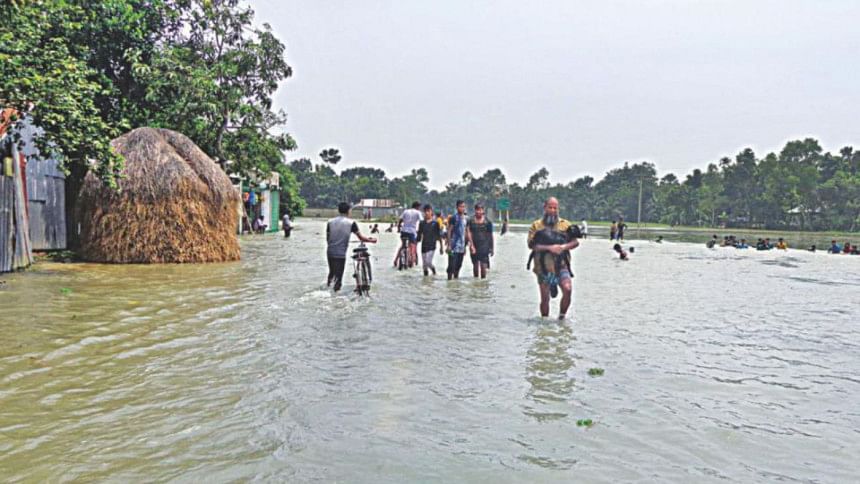Saving flood victims as we look for solutions

The year was 1988. My uncle was going to the United States for his undergraduate degree. He was the first family member to do so. The trend in those days was England. And, not just England, but Oxford and Cambridge. So, with his decision to go to the US, the first seed of the American Dream was sown. Perhaps, we don't have to go to England, my twin and I looked at each other excitedly, wondering what a brand new country looks like. We were almost 8 years old and full of hope, sitting at the back of the Volkswagen that our father was driving. We were all going to the airport; back then such "seeing off" were family events.
On our drive from Dhanmondi to the airport—which was a long one, or so it seemed to an 8 year old—water started gushing into the car through the cracks in the doors, I assume, and soon our feet were submerged. We pulled our feet up but the water level kept rising. Yet, our father kept driving through the deluge. Till date, I have no idea how. Airport Road was under water, and that was the first and last time I had seen it that way. That is to say that that was the worst flood that I had ever witnessed.
I knew things were bad when some of our classmates started taking boats to school. The only television channel we had then, the state-run BTV, showed President Ershad on his visits to flood affected regions in his speed boat, singing emotive songs, which he had penned, about those trying times. We heard our parents and grandparents noting how little that did in terms of alleviating the problems of displacement, hunger, and disease. I remember relief efforts being organised by almost everyone I knew. Eventually our school had closed down. I also remember that President Ershad had made money off of boats that were being bought with aid money. My memory is vague, and Google isn't helping much (maybe I should ask my mother), but it was his corruption in aid disbursement during and after those floods, among other misrules, that had resulted in the building of a strong resistance that finally led to his downfall.
Those were the days when Bangladesh was known primarily for its floods and the destruction that it wreaked. Back then we were reliant on aid when such disasters struck.
Since then, but particularly in the last decade or so, Bangladesh has shown that people no longer need to die from floods. Dams and embankments created based on 20 year estimates of increments in sea-level have served the country well.
Until now. This year's flood is predicted to be the worst flood in 100 years.
Some are wondering how we got here.
One explanation is climate change. Incessant rains have a tendency to create floods, particularly in countries like Bangladesh that has compromised drainage systems. An important reason for that are the landfills that have replaced wetlands across the country. The more wetlands there are the less likelihood of flooding in valleys, research shows, quietly pointing fingers at those who sanctioned the landfills to begin with. So when we ascribe floods as "natural disaster" we must ask ourselves how "natural" the causes really are, particularly when the situation starts to resemble the infamous Bengal Famine during colonial rule.
Most of these natural disasters are in fact manmade, and we must consider wetland restoration as one of the possible solutions.
Another possible solution could be to relocate people, at least seasonally, from char areas by building up, rather than across, in vertical neighbourhoods that can provide short and long-term housing solutions. This will require substantial investment, the livelihoods of the people who will live there will need to be factored in—perhaps by skills training programmes, and the political economy of construction and commission versus humanitarian aid will have to assessed. In other words, those who make money from people's suffering will have to think about their source of income, and ask this difficult question: would it be more profitable to get a commission from home-builders who will get the contract to build these neighbourhoods, or will it be easier to simply continue to make money off of humanitarian aid?
Yet another solution could be to perhaps create bilateral ties with nations such as Portugal and Spain that are at risk of "population disasters" in light of decades of falling birth rates and negotiate a transfer of "climate change refugees" from Bangladesh. That Bangladesh will be among the first few countries to be majorly affected by climate change is well documented by scientists. While we don't know exactly when that will happen, recent research has shown that Bangladesh along with some other regions in South Asia will become uninhabitable in another 100 years. This means we will start to see changes fairly soon, which in turn means we just might be able to make a case for a migration programme of sorts that will be beneficial for all concerned. Knowing how geopolitics works, this seems a little untenable, but it's perhaps worth a try, because the point is this: we need to think out of the proverbial box. We need 101 brainstorming sessions and to come up with as many solutions as we can think of.
What we are seeing today is a repetition of what we saw in 1988. If predictions are to be believed things will get worse. We need solutions, even if we can't implement them overnight. We need solutions because gathering relief and aid from individuals is not a tenable long-term solution. As I keep saying, individuals cannot or are not in a position to take personal responsibility for structural problems, including floods. We have to rehabilitate all the families that have lost everything they had: their homes, their possessions, their livestock, their cattle, their produce. We have to find solutions that will not make such losses a regular occurrence.
While we brainstorm, though, let us all contribute to relief efforts by donating to organisations and people we trust. Let us do it out of love, as Firoz Ahmed of Bangladesh Chhatra Federation implored, not out of pity, because right now these farmers need us, the people in the char areas need us, the people in the north who are facing the brunt of this year's calamity need us, not because they are poor or because they didn't work hard enough as some people would like to think, but because they lost everything to the floods, while many of us haven't.
Nadine Shaanta Murshid is Assistant Professor, School of Social Work, University at Buffalo, State University of New York.





Comments